- Home
- Ellen Datlow
The Green Man Page 5
The Green Man Read online
Page 5
Stored in the lid, held apart from each other by slots, were three 8 x 10 wooden panels, each with a painting on it. For all their quick and loose rendering, she had no trouble recognizing the subjects. There was something familiar about them, too—beyond the subject matter that she easily recognized.
The first was of the staircase waterfall where the creek took a sudden tumble before continuing on again at a more level pace. She had to fill in detail from her own memory and imagination, but she knew it was that place.
The second was of a long-deserted homestead up a side valley of the hollow, the tin roof sagging, the rotting walls falling inward. It was nothing like Aunt’s cabin on its sunny slopes, surrounded by wild roses, old beehives, and an apple orchard that she and Aunt were slowly reclaiming from the wild. This was a place that would only get sun from midmorning through the early afternoon, a dark and damp hollow, where the dew never had a chance to burn off completely.
The last one could have been painted anywhere in this forest but she imagined it had been done down by the creek, looking up a slope into a view of yellow birches, beech, and sprucey-pines growing dense and thick as the stars overhead, with a burst of light coming through a break in the canopy.
Lily studied each painting, then carefully set them aside on the ground beside her. There was the hint of another picture on the inside lid itself, but she couldn’t make out what it was supposed to be.
The palette was covered in dried paint that, like the inside lid, almost had the look of a painting itself, and lifted from the box to reveal a compartment underneath. In the bottom of the box were tubes of oil paint, brushes, and a palette knife, a small bottle of turpentine and a rag stained with all the colors the artist had been using.
Lily turned the palette over and there she found what she’d been looking for. An identifying mark. She ran a finger over the letters that spelled out an impossible name.
Milo Johnson.
Treasure.
“Milo Johnson,” Aunt repeated, trying to understand Lily’s excitement. At seventeen, Lily could still get as wound up about a new thing as she had when she was a child. “Should I know that name?”
Lily gave her a “you never pay attention, do you?” look and went to get a book from her bookshelf. She didn’t have many, but those she did have had been read over and over again. The one she brought back to the kitchen table was called The Newford Naturalists: Redefining the Landscape. Opening it to the first artist profiled, she underlined his name with her finger.
Aunt read silently along with her, mouthing the words, then studied the black-and-white photo of Johnson that accompanied the profile.
“I remember seeing him a time or two,” she said. “Tramping through the woods with an old canvas knapsack on his back. But that was a long time ago.”
“It would have to have been.”
Aunt read a little more, then looked up.
“So he’s famous then,” she asked.
“Very. He went painting all through these hills and he’s got pictures in galleries all over the world.”
“Imagine that. And you reckon this is his box?”
Lily nodded.
“Well, we’d better see about returning it to him.”
“We can’t,” Lily told her. “He’s dead. Or at least they say he’s dead. He and Frank Spain went out into the hills on a painting expedition and were never heard from again.”
She flipped towards the back of the book until she came to the smaller section devoted to Spain’s work. Johnson had been the giant among the Newford Naturalists, his bold, dynamic style instantly recognizable, even to those who might not know him by name, while Spain had been one of a group of younger artists that Johnson and his fellow Naturalists had been mentoring. He wasn’t as well known as Johnson or the others, but he’d already been showing the potential to become a leader in his own right before he and Johnson had taken that last fateful trip.
It was all in the book which Lily had practically memorized by now, she’d read it so often.
Ever since Harlene Welch had given it to her a few years ago, Lily had wanted to grow up to be like the Naturalists—especially Johnson. Not to paint exactly the way they did, necessarily, but to have her own individual vision the way that they did. To be able to take the world of her beloved hills and forest and portray it in such a way that others would see it through her eyes, that they would see it in a new way and so understand her love for it and would want to protect it the way that she did.
“That was twenty years ago,” Lily added, “and their bodies weren’t ever recovered.”
Twenty years ago. Imagine. The box had been lying lost in the woods for all that time.
“Never thought of painting pictures as being something dangerous,” Aunt said.
“Anything can be dangerous,” Lily replied. “That’s what Beau says.”
Aunt nodded. She reached across the table to turn the box towards her.
“So you plan on keeping it?” she asked.
“I guess.”
“He must have kin. Don’t you think it should go to them?”
Lily shook her head. “He was an orphan, just like me. The only people we could give it to would be in the museum and they’d just stick it away in some drawer somewhere.”
“Even the pictures?”
“Well, probably not them. But the painting box for sure…”
Lily hungered to try the paints and brushes she’d found in the box. There was never enough money for her to think of being able to buy either.
“Well,” Aunt said. “You found it, so I guess you get to decide what you do with it.”
“I guess.”
Finder’s keepers, after all. But she couldn’t help feeling that this find of hers—especially the paintings—belonged to everyone, not just some gangly backwoods girl who happened to come upon them while out on a ramble.
“I’ll have to think on it,” she added.
Aunt nodded, then got up to put on the kettle.
The next morning Lily went about her chores. She fed the chickens, sparing a few handfuls of feed for the sparrows and other birds that were waiting expectantly in the trees nearby. She milked the cow and poured some milk into a saucer for the cats that came out of the woods when she was done, purring and winding in between her legs until she set the saucer down. By the time she’d finished weeding the garden and filling the woodbox, it was midmorning.
She packed herself a lunch and stowed it in her shoulder satchel along with some carpenter’s pencils and a pad of sketching paper she’d made from cutting up brown grocery bags.
“Off again, are you?” Aunt asked.
“I’ll be home for dinner.”
“You’re not going to bring that box with you?”
She was tempted. The tubes of paint were rusted shut, but she’d squeezed the thin metal of their bodies and found that the paint inside was still pliable. The brushes were good, too. But her using them didn’t seem right. Not yet, anyways.
“Not today,” she told Aunt.
As she left the house she looked up to see a pair of dogs coming tearing up the slope towards her. They were the Shaffers’ dogs, Max and Kiki, the one dark brown, the other white with black markings, the pair of them bundles of short-haired energy. The Shaffers lived beside the Welchs, who owned the farm at the end of the trail that ran from the county road to Aunt’s cabin—an hour’s walk through the woods as you followed the creek. Their dogs were a friendly pair, good at not chasing cows or game, and showed up every few days to accompany Lily on her rambles.
The dogs danced around her now as she set off through the orchard. When she got to the Apple Tree Man’s tree—that’s what Aunt called the oldest tree of the orchard—she pulled out a biscuit she’d saved from breakfast and set it down at its roots. It was a habit she’d had since she was a little girl, like feeding the birds and the cats while doing her morning chores. Aunt used to tease her about it, telling her what a good provider she was for the mice and raccoons.
“Shoo,” she said as Kiki went for the biscuit. “That’s not for you. You’ll have to wait for lunch to get yours.”
They climbed up to the top of the hill and then went into the woods, the dogs chasing each other in circles while Lily kept stopping to investigate some interesting seed pod or cluster of weeds. They had lunch a couple of miles further on, sitting on a stone outcrop that overlooked the Big Sinkhole, a two or three acre depression with the entrance to a cave at the bottom.
Most of the mountains around Aunt’s cabin were riddled with caves of all shapes and sizes. There were entrances everywhere, though most only went a few yards in before they ended. But some said you could walk from one end of the Kickaha Hills to the other, all underground, if you knew the way.
Lunch finished, Lily slid down from the rock. She didn’t feel like drawing today. Instead she kept thinking about the painting box, how odd it had been to find it after its having been lost for so many years, so she led the dogs back to that part of the woods to see what else she might find. A shiver went up her spine. What if she found their bones?
The dogs grew more playful as she neared the spot where she’d come upon the box. They nipped at her sleeves or crouched ahead of her, butts and tails in the air, growling so fiercely they made her laugh. Finally Max bumped her leg with his head just as she was in midstep. She lost her balance and fell into a pile of leaves, her satchel tumbling to the ground, spilling drawings.
She sat up. A smile kept twitching at the corner of her mouth but she managed to give them a pretty fierce glare.
“Two against one?” she said. “Well, come on, you bullies. I’m ready for you.”
She jumped on Kiki and wrestled her to the ground, the dog squirming with delight in her grip. Max joined the tussle and soon the three of them were rolling about in the leaves like the puppies the dogs no longer were and Lily had never been. They were having such fun that at first none of them heard the shouting. When they did, they stopped their roughhousing to find a man standing nearby, holding a stick in his upraised hand.
“Get away from her!” he cried, waving the stick.
Lily sat up, so many leaves tangled in her hair and caught in her sweater that she had more on her than did some of the autumned trees around them. She put a hand on the collar of either dog, but, curiously, neither seemed inclined to bark or chase the stranger off. They stayed by her side, staring at him.
Lily studied him for a long moment, too, as quiet as the dogs. He wasn’t a big man, but he seemed solid, dressed in a fraying broadcloth suit with a white shirt underneath and worn leather boots on his feet. His hair was roughly trimmed and he looked as if he hadn’t shaved for a few days. But he had a good face—strong features, laugh lines around his eyes and the corners of his mouth. She didn’t think he was much older than her.
“It’s all right,” she told the man. “We were just funning.”
There was something familiar about him, but she couldn’t place it immediately.
“Of course,” he said, dropping the stick. “How stupid can I be? What animal in this forest would harm its Lady?” He went down on his knees. “Forgive my impertinence.”
This was too odd for words, from the strange behavior of the dogs to the man’s even stranger behavior. She couldn’t speak. Then something changed in the man’s eyes. There’d been a lost look in them a moment ago, but also hope. Now there was only resignation.
“You’re just a girl,” he said.
Lily found her voice at that indignity.
“I’m seventeen,” she told him. “In these parts, there’s some would think I’m already an old maid.”
He shook his head. “Your pardon. I meant no insult.”
Lily relaxed a little. “That’s all right.”
He reached over to where her drawings had spilled from her satchel and put them back in, looking at each one for a moment before he did.
“These are good,” he said. “Better than good.”
For those few moments while he looked through her drawings, while he looked at them carefully, one by one, before replacing them in her satchel, he seemed different once more. Not so lost. Not so sad.
“Thank you,” she said.
She waited a moment, thinking it might be rude of her to follow a compliment with a question that might be considered prying. She waited until the last drawing was back in her satchel and he sat there holding the leather bag on his lap, his gaze gone she didn’t know where.
“What are you doing here in the woods?” she finally asked.
It took a moment before his gaze returned to her. He closed the satchel and laid it on the grass between them.
“I took you for someone else,” he said, which wasn’t an answer at all. “It was the wild tangle of your red hair—the leaves in it and on your sweater. But you’re too young and your skin’s not a coppery brown.”
“And this explains what?” she asked.
“I thought you were Her,” he said.
Lily could hear the emphasis he put on the word, but it still didn’t clear up her confusion.
“I don’t know what you’re talking about,” she said.
She started to pluck the leaves out of her hair and brush them from her sweater. The dogs lay down, one on either side of her, still curiously subdued.
“I thought you were the Lady of the Wood,” he explained. “She who stepped out of a tree and welcomed us when we came out of the cave between the worlds. She wears a cloak of leaves and has moonlight in Her eyes.”
A strange feeling came over Lily when he said “stepped out of a tree.” She found herself remembering a fever dream she’d once had—five years ago when she’d been snake bit. It had been so odd. She’d dreamt that she’d been changed into a kitten to save her from the snake bite, met Aunt’s Apple Tree Man and another wood spirit called the Father of Cats. She’d even seen the fairies she’d tried to find for so long: foxfired shapes, bobbing in the meadow like fireflies.
That dream had seemed so real.
She blinked away the memory of it and focused on the stranger again. He’d gotten off his knees and was sitting cross-legged on the ground, a half dozen feet from where she and the dogs were.
“What did you mean when you said ‘us’?” she asked.
Now it was his turn to look confused.
“You said this lady showed ‘us’ some cave.”
He nodded. “I was out painting with Milo when—”
As soon as he mentioned that name, the earlier sense of familiarity collided with her memory of a photo in her book on the Newford Naturalists.
“You’re Frank Spain!” Lily cried.
He nodded in agreement.
“But that can’t be,” she said. “You don’t look any older than you do in the picture in my book.”
“What book?”
“The one about Milo Johnson and the rest of the Newford Naturalists that’s back at the cabin.”
“There’s a book about us?”
“You’re famous,” Lily told him with a grin. “The book says you and Mr. Johnson disappeared twenty years ago while you were out painting in these very hills.”
Frank shook his head, the shock plain in his features.
“Twenty… years?” he said slowly. “How’s that even possible? We’ve only been gone for a few days…”
“What happened to you?” Lily asked.
“I don’t really know,” he said. “We’d come here after a winter of being cooped up in the studio, longing to paint in the landscape itself. We meant to stay until the black flies drove us back to the city but then…” He shook his head. “Then we found the cave and met the Lady.…”
He seemed so lost and confused that Lily took him home.
Aunt greeted his arrival and introduction with a raised eyebrow. Lily knew what she was thinking. First a painting box, now a painter. What would be next?
But Aunt had never turned anyone away from her cabin before and she wasn’t about to start now. Sh
e had Lily show Frank to where he could draw some water from the well and clean up, then set a third plate for supper. It wasn’t until later when they were sitting out on the porch drinking tea and watching the night fall that Frank told them his story. He spoke of how he and Milo had found the cave that led them through darkness into another world. How they’d met the Lady there, with Her cloak of leaves and Her coppery skin, Her dark, dark eyes and Her fox-red hair.
“So there is a underground way through these mountains,” Aunt said. “I always reckoned there was some truth to that story.”
Frank shook his head. “The cave didn’t take us to the other side of the mountains. It took us out of this world and into another.”
Aunt smiled. “Next thing you’re going to tell me is you’ve been to Fairyland.”
“Look at him,” Lily said. She went inside and got her book, opening it to the photograph of Frank Spain. “He doesn’t look any older than he did when this picture was taken.”
Aunt nodded. “Some people do age well.”
“Not this well,” Lily said.
Aunt turned to Frank. “So what is it that you’re asking us to believe?”
“I’m not asking anything,” he said. “I don’t believe it myself.”
Lily sighed and took the book over to him. She showed him the copyright date, put her finger on the paragraph that described how he and Milo Johnson had gone missing some fifteen years earlier.
“The book’s five years old,” she said. “But I think we’ve got a newspaper that’s no more than a month old. I could show you the date on it.”
But Frank was already shaking his head. He’d gone pale reading the paragraph about the mystery of his and his mentor’s disappearance. He lifted his gaze to meet Aunt’s.
“I guess maybe we were in Fairyland,” he said, his voice gone soft.
Aunt looked from Lily’s face to that of her guest.
“How’s that possible?” she said.
“I truly don’t know,” he told her.
He turned the pages of the book, stopping to read the section on himself. Lily knew what he was reading. His father had died in a mining accident when he was still a boy, but his mother had been alive when he’d disappeared. She’d died five years later.

 Inferno
Inferno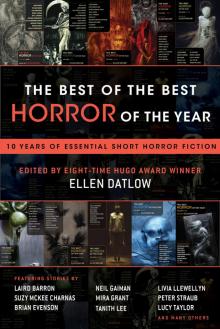 The Best of the Best Horror of the Year
The Best of the Best Horror of the Year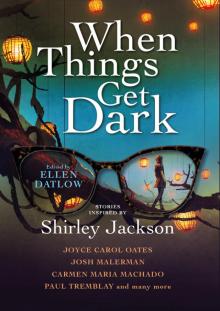 When Things Get Dark
When Things Get Dark A Whisper of Blood
A Whisper of Blood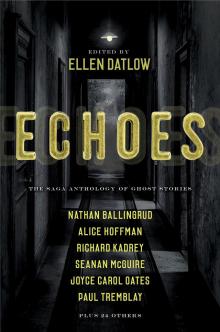 Echoes
Echoes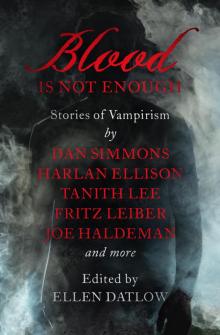 Blood Is Not Enough
Blood Is Not Enough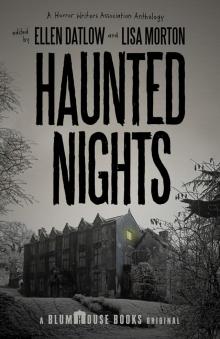 Haunted Nights
Haunted Nights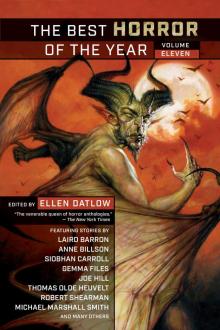 The Best Horror of the Year Volume Eleven
The Best Horror of the Year Volume Eleven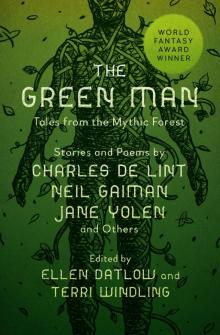 The Green Man
The Green Man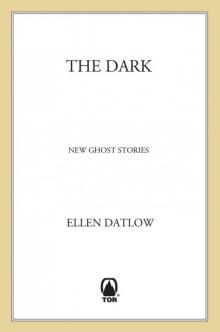 The Dark
The Dark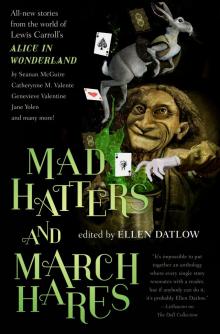 Mad Hatters and March Hares
Mad Hatters and March Hares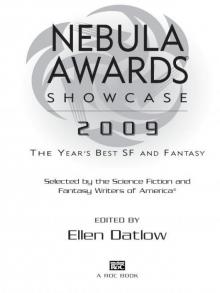 Nebula Awards Showcase 2009
Nebula Awards Showcase 2009 The Devil and the Deep
The Devil and the Deep